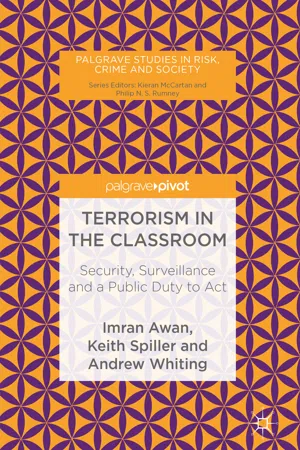Since the events of September 11, 2001, that heralded the beginning of the ongoing Global War on Terror, but despite the elapse of so much time, a series of attacks targeting Western nations in particular have seen the expansion of counter-terrorism legislation and practices rather than their scaling down. The UK has been no exception to this trend, and this has culminated in an unprecedented formal encroachment of counter-extremism into the public sector. The most recent and overarching development in this regard is the government’s publication of the third incarnation of its counter-terrorism strategy CONTEST (HM Government 2018) (with the sobriquet of CONTEST 3).
The Counter-Terrorism Security Act (CTSA) that came into law in 2015 imposed a statutory legal duty (often referred to as the Prevent Duty) upon all public sector workers to be aware and mindful of the vulnerabilities towards extremism. The CTSA imposes this duty on local authorities, schools, colleges, higher education institutions, health bodies, prisons and probation, and the police. For this book, education is the focus, and within this context this means that primary and secondary school teachers, teaching assistants, nursery school staff, registered childminders, as well as further education (FE) tutors and university lecturers are required to pay ‘due regard to the need to prevent people from being drawn into terrorism’ (HM Government 2015: 5) and look out for signs of vulnerability/radicalisation in the young people they teach and potentially report those who are ‘at risk’. The CTSA elaborates on this formal expansion of counter-terrorism into education, explaining that protecting pupils from radicalisation should be understood as part of educator’s wider safeguarding responsibilities and that education providers are expected to have ‘clear policies in place to safeguard students and build their resilience to radicalisation in schools, further and higher education institutions’ (HM Government 2018: 36).
As three academics teaching and researching within a UK University, our initial motivations for this book came specifically in relation to the CTSA and our own unease around what was now being legally required of us in our role as educators. This is broadly echoed in education in the UK, where primary schools, secondary schools, and the higher education (HE) sector (or post-secondary education, which included universities, sixth form colleges, and vocational training) all must comply with the new policy. The manner in which counter-terrorism and education had come together under the CTSA and the further entrenchment of this trend under CONTEST 3 were unprecedented and raised immediate and serious questions as to why this was occurring, how it would be operationalised, its appropriateness, its effectiveness, and the potential for harmful consequences. It should be noted that the CTSA does explicitly state that ‘a specified authority must have particular regard to the duty to ensure freedom of speech’ (HM Government 2015: 21), and CONTEST recognises that ‘encouraging free speech and open debate is one of our most powerful tools in promoting critical thinking and preventing terrorist and extremist narratives taking hold’ (HM Government 2018: 37). However, as active researchers with expertise across the fields of security, terrorism, surveillance, hate crime, and Islamophobia, we had experience with some of the areas and issues that this new duty had given rise to and subsequently began to explore recent developments at the intersection of counter-terrorism, counter-extremism, and education.
With this in mind, the overarching objective of this book is to chart contemporary developments in UK counter-extremism within UK education, and we explicitly document the current legislation which underpins the CTSA and then seek to document how those working in education have responded to the Act. The substantive focus of the book therefore is within the UK context, with the notable exception of Chap. 6 (discussed later in the chapter), which takes a deliberately international outlook. Within this overarching objective we seek to achieve a number of separate aims. First, we aim to provide the reader with a knowledge of ‘how we got here’ and explain the controversy that has surrounded the Prevent agenda prior to and since its expansion into UK education sector. Second, we aim to situate the recent developments in the UK within a broader international context to better understand how educational initiatives to counter extremism, promote peace, and develop resilience have been carried out elsewhere. Third, we aim to provide a wide-ranging critique of this expansion into education that draws on theories of surveillance and theories of power as well as our own empirical research with university lecturers in the UK.
We set out to achieve these aims and objectives by first outlining the broader context and exploring the key terminology surrounding terrorism and its prevention before setting this within the context of education. In Chap. 2, we consider the controversy and contestation that surrounds the concepts of radicalisation and extremism and how ambiguity here as well as around notions of Britishness creates difficulties in how the government shapes counter-terrorism policy. Chapter 3 considers the counter-terrorism legislation that has come about in the UK since the events of September 11, 2001, notably charting the development of the different versions of the CONTEST strategy. It is in this chapter that we pay particular attention to Prevent and the arrival of the CTSA that has seen UK ...
